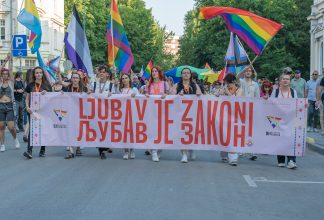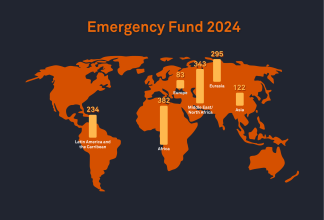Questions and Answers on Israel and Palestine
During the past months, Civil Rights Defenders has received questions on why we don´t communicate about the situation in Israel and Palestine. Please find answers to some of the most common questions below.
Q: Why hasn’t Civil Rights Defenders made any comments about the situation in Israel and Palestine?
A: We understand that it may raise questions that we, as an international human rights organisation, have not communicated about the war in Gaza or the Hamas attack in Israel in October.
Civil Rights Defenders communicates and advocates for human rights together with partners and human rights defenders in the countries where we work. Currently, Civil Rights Defenders does not work in Israel or Palestine. Our work and, thus, our communication is carried out in close collaboration with and primarily based on our local partners’ needs and priorities.
However, we are, of course, highly aware of the situation and deeply saddened and alarmed by the violence and atrocities, which over the course of the past months have led to thousands of deaths and immeasurable human suffering. The violence must stop, and the UN Security Council Resolution 2728 (2024) should be adhered to.
We are also deeply concerned that states have not unequivocally taken a stand for a rule-based order in the protection of the lives and health of civilians. We worry about the implications that this brings for civilians in Israel and Palestine, as well as for civilians in ongoing and future conflicts elsewhere in the world.
Q: Civil Rights Defenders works with international core crimes; what does international law say about the current situation?
A: Parties to an armed conflict must respect and adhere to international humanitarian law and international criminal law and should be held accountable for violations. In an armed conflict, civilians must not be targeted. Everything possible should be done to safeguard the lives and rights of civilians, including ensuring that they have unimpeded access to humanitarian assistance.
To conduct a systemic or widespread attack against a civilian population or to engage in killing or other acts with the intention to destroy in whole or in part a national, ethnic, racial, or religious group constitute the crimes of genocide and crimes against humanity under international criminal law.
Justice for violations of international law may be delivered by international and independent justice mechanisms, such as the International Court of Justice (ICJ) and the International Criminal Court (ICC), established through agreements between a majority of the world’s states.
The investigation by the Office of the Prosecutor of the ICC will be crucial in assessing violations of international law by representatives of the state of Israel as well as Palestinian non-state actors.
The findings of ICJ in its decision on 10 January 2024 may also become relevant for the prosecutor’s examination going forward.
States should express their support for these justice processes, as impunity tends to fuel further violations and undermines the international legal order.


